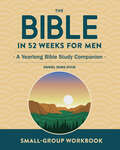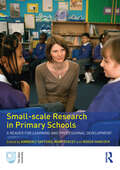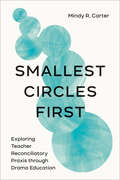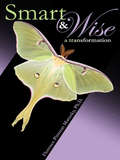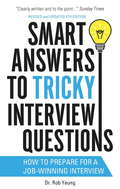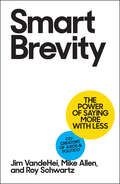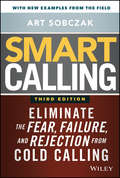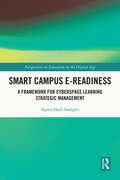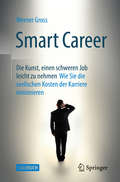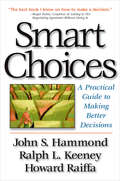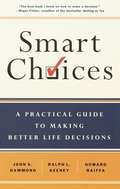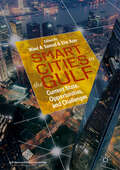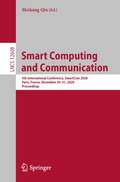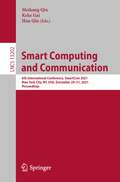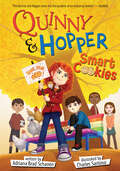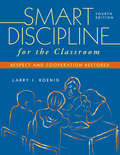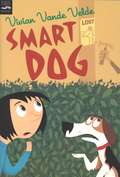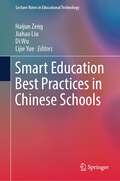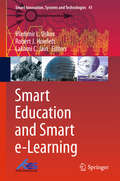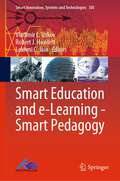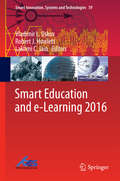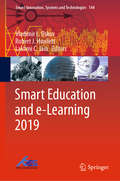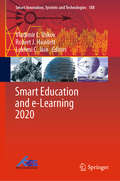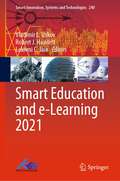- Table View
- List View
Small-Group Workbook: A Yearlong Bible Study Companion
by Daniel Sung HyunGather a study group and explore the entire Bible in one year Studying the Bible with others helps you open yourself up to greater meaning and reflection than studying alone. This small group workbook guides Christian men through the entire Bible every week for one year. Together, you'll explore prompts, questions, activities, and prayers that lead you from Genesis to Revelation. Written for men—Find thoughtfully curated discussion topics that focus on what it means to be a man of faith. Easy to manage—The readings are only a few pages long, paired with a schedule to fit every chapter of the Bible into 52 weeks. Opportunities to engage—Each week includes suggested passages to read, a short devotion, questions and exercises for the group, and a prayer to close each session. Get to know the Word in a new light and strengthen your relationship with Christ with this group Bible study for men.
Small-Scale Research in Primary Schools: A Reader for Learning and Professional Development
by Mary Stacey Kimberly Safford Roger HancockSmall-scale Research in Primary Schools provides guidance and inspiration for students and practitioners undertaking practical investigations and workplace enquiry in the primary school. The 30 chapters are carefully selected to illustrate a range of approaches to educational enquiry, and are particularly relevant to the range of practitioners who may carry out school-based research as part of a course of study: teachers, trainee- and newly-qualified teachers, teaching assistants, learning mentors and staff who support children with individual needs. Research topics addressed in chapters include children’s learning in the core curriculum subjects as well as themes central to teaching and learning. Important concepts and terminology are highlighted throughout. More specifically, areas of research explored include: Play Special Educational Needs Working with parents and families English as an Additional Language Creativity Language development Learning environments Small-scale Research in Primary Schools provides a straightforward, highly accessible introduction to enquiry approaches and research methodologies, and the questions and challenges adults in schools encounter about children’s learning. It shows how small-scale research in primary education can impact on professional thinking and learning. It aims to provide constructive support for students and practitioners in extending their knowledge and understanding through workplace enquiry.
Smallest Circles First: Exploring Teacher Reconciliatory Praxis through Drama Education
by Mindy R. CarterDrawing from studies with pre- and in-service teachers in Quebec, Smallest Circles First looks at how teacher agency engages with the educational calls to action from Canada’s Truth and Reconciliation Commission. Using drama education and theatre, Smallest Circles First explores how the classroom can be used as a liminal educational site to participate in reconciliatory praxis. Smallest Circles First presents several arts-based educational research examples that illustrate how the arts provide a space for students, teachers, and communities to explore and learn about reconciliation praxis and responsibilities. By implementing arts-based counter-narratives set against settler Canadian history and geography, Smallest Circles First considers the implications of systemic racism, colonization, and political, social, and economic ramifications of governmental policies. Tangible examples from the book showcase how teachers and students can use the arts to learn specifically about their responsibilities in engaging with Canada’s Truth and Reconciliation Commission, in addition to how this work can still meet curricular learning outcomes.
Smart & Wise: A Transformation
by Florence Pittman MatuskyFlorence Matusky proposes that K-12 public education's primary focus on one hemisphere only (the left-brain) - to be test smart,not wise - produces students whose impoverished, "approved" knowledge is not for understanding self,others,or how to live,but for programming them with by-the-book,academic knowledge then reducing them to numbers.The rationale for flourish or perish ensures failures and dropouts; fosters poverty,crime,violence,addictions,greed,or selfishness;and jeopardizes two of America's Four Freedoms (freedom from fear and want).No one comes into this world and to school with a clean slate. We are born self-centered to get our survival needs met and with inherited and experiential embedded data from conception onward.All children and adults need to express their significance. When children experience being loved,respected, and their embedded true life stories - which are played out as behavior,appearance,and capacity to learn in school - are heard, understood, and accepted, then they learn to love, respect, and accept themselves and others "as is." Released from ego deficits and negativity,they are present to their full human intelligence.When the invisible curriculum(self-awareness, humane redevelopment, emotional resilience, virtues, and character) is not taught and modeled at home and in K-12 public schools,children's uneducated egos and passion and/or lack of meaning and respect override cognition,creating anti-social acts and unsafe societies. As adults, many seek significance outside themselves: power-over people,wealth, and/or the world's stage, creating wars, economic bubbles, income inequality,and declining human qualities and inner lives.Our societal ills are reflections of The Western Intellectual Tradition's legacy. Smart & Wise offers reasons for and solutions to America's quantitative, unequal public schools so students may rise to their higher faculties and excel in math,reading,science,innovation,communications,and relationships.
Smart Answers to Tricky Interview Questions: How to prepare for a job-winning interview
by Dr. Rob YeungThis is a book for job seekers that covers just about every interview scenario that they might have to deal with and includes over 200 examples of just about every question they may be asked, with examples of appropriate answers. Provides inside information from an author who is frequently asked by organisations to interview candidates, design assessment centres, and train interviewers. He writes the questions for interviewers to ask - and tells them the answers they should listen out for.This new edition includes a new chapter on building rapport and making a confident impact.
Smart Answers to Tricky Interview Questions: How to prepare for a job-winning interview
by Rob YeungThis is a book for job seekers that covers just about every interview scenario that they might have to deal with and includes over 200 examples of just about every question they may be asked, with examples of appropriate answers. Provides inside information from an author who is frequently asked by organisations to interview candidates, design assessment centres, and train interviewers. He writes the questions for interviewers to ask - and tells them the answers they should listen out for.This new edition includes a new chapter on building rapport and making a confident impact.
Smart Brevity: The Power of Saying More with Less
by Mike Allen Jim VandeHei Roy SchwartzBrevity is confidence. Length is fear. This is the guiding principle of Smart Brevity, a communication formula built by Axios journalists to prioritize essential news and information, explain its impact and deliver it in a concise and visual format. Now, the co-founders of Axios have created an essential guide for communicating effectively and efficiently using Smart Brevity—think Strunk and White&’s Elements of Style for the digital age. In SMART BREVITY: The Power of Saying More with Less, Axios co-founders Jim VandeHei, Mike Allen, and Roy Schwartz teach readers how to say more with less in virtually any format. They also share communications lessons learned from their decades of experience in media, business and communications.
Smart Calling: Eliminate the Fear, Failure, and Rejection from Cold Calling
by Art SobczakMaster cold-calling and eliminate rejection forever In the newest edition of Smart Calling: Eliminate the Fear, Failure, and Rejection from Cold Calling, celebrated author and sales trainer, Art Sobczak packs even more powerful insight into what many people fear: prospecting by phone for new business. This best-selling guide to “never experiencing rejection again” has consistently found its way into the Top 20 in Amazon’s Sales category, because its actionable sales tips and techniques have helped many minimize their fears and eliminate rejection. The newest edition builds upon the very successful formula of the last edition to help sales professionals take control of their strategy and get more yeses from their prospects. With new information, this info-packed release provides powerful sales insights, including: The foundational concepts of cold calling, featuring real-life examples you can carry with you into your sales career Multiple case studies and messaging from successful salespeople across the globe, providing even more insight into what works and what's a waste of your time New methodologies that are proven to push you past your fear and into the world of successful prospecting Free access to Art Sobczak’s Smart Calling Companion Course, where he builds on the many techniques and strategies in the book, and will update it with new material and tech resources so that you will always have the current best practices and tools. If you’re failing to convert your prospects into dollars, Smart Calling will help you push past the obstacles holding you back until you’re an expert at taking a “no” and turning it into a “yes.”
Smart Campus E-Readiness: A Framework for Cyberspace Learning Strategic Management (Perspectives on Education in the Digital Age)
by Sayed Hadi SadeghiThis book discusses the concept of the smart campus and e-learning practice in tertiary education, showing the relevance of the smart campus to the current learning environment. It provides a pedagogical framework for good practice in smart university campuses. The book outlines the interdisciplinary concept of the smart campus and draws on technology, education, and learning sciences to show how the smart campus can best work. It examines e-practice assessment in three different contexts, namely the United States, Australia, and Iran, from the perspective of administrators, faculty members, and students. Using this international comparative analysis, the book determines the existing advantages and disadvantages of existing e-learning systems. It offers a framework for researchers and developers to accelerate and assess the readiness of current campuses to optimize teaching, learning, and research at the university. This highly topical book will be essential reading for researchers, scholars, and post-graduate students in the fields of educational technology, digital education, higher education, and e-learning. It will also be useful for higher education instructors and university administrators to understand how smart campus knowledge can be integrated with other learning and teaching experiences.
Smart Career: Wie Sie die seelischen Kosten der Karriere minimieren
by Werner GrossIn diesem Sachbuch soll es einmal nicht nur um die Schokoladenseiten der Karriere gehen, sondern auch um die Schattenseiten: Selbstdisziplin bis zur Selbstverleugnung, übertriebene Außenorientierung und exzessive Anpassungsleistungen nach unausgesprochenen Wohlverhaltensklauseln produzieren mitunter zunehmendes Fassadenverhalten: Stoßfest, bruchsicher, formschön und abwaschbar heißt für viele die Devise auf der Karriereleiter. Gar nicht so selten geht damit ein schleichender Verlust der Menschlichkeit einher. Geschrieben für Laien und Interessierte; Psychotherapeuten, Coaches, Berater können prozessbegleitend empfehlen. Aus dem Inhalt: Die beruflichen Anforderungen bis zum Jahr 2025 – Gefahren auf der Karriereleiter (körperliche, seelische, soziale) – Warum und wie man in berufliche Krisen gerät – Krise als Chance und als Möglichkeit, sein Leben neu auszurichten – 4 Bereiche einer gesunden Identität – „Funktionslust“ oder: der Spaß am Beruf – Von der Karriereleiter zum Karrierenetzwerk – Zwischen Effizienz und Menschlichkeit: Ressourcen aktivieren, psychosoziale Reibungsverluste minimieren, Arbeitsprozesse optimieren, angemessene Problemlösungen finden – Gibt es mehr im Leben, als Effizienz und Geschwindigkeit zu erhöhen? – Expatriates, Downshifting und Sabbatical – Hilfen von außen: Coaching, Supervision, Psychotherapie. Über den Autor: Werner Gross, Dipl.-Psychologe, Psychotherapeut, Supervisor und Coach, Organisations- und Unternehmensberater.
Smart Choices: A Practical Guide to Making Better Choices
by John S. Hammond Ralph L. Keeney Howard RaiffaWhere should I live? Is it time to switch careers? What is the best course of action for me? Decisions shape our experiences, from choosing which job offer to accept, to buying the right car, to selecting a good accountant. How do we know which choice is the smart one? How can we be consistent and confident in our decisions? In this book from the three leading authorities on decision-making, readers learn how to approach all types of decisions with a simple set of skills developed by professors from Harvard, MIT, and the University of Southern California. Combining solid research with common sense and practical experience, this user-friendly guide shows readers how to assess deep-seated objectives, create a comprehensive set of alternatives, determine likely consequences, make tradeoffs, and grapple with uncertainty. Not only will readers learn how to make decisions, they will learn how to make the smartest decisions. For anyone caught at a confusing crossroad–whether you’re choosing between mutual funds or deciding where to retire–the Smart Choices program will improve your decision-making abilities immediately, and make your life more rewarding and fulfilling.
Smart Choices: A Practical Guide to Making Better Decisions
by John S. Hammond Ralph L. Keeney Howard RaiffaWhere should I live? Is it time to switch careers? What is the best course of action for me? Decisions shape our experiences, from choosing which job offer to accept, to buying the right car, to selecting a good accountant. How do we know which choice is the smart one? How can we be consistent and confident in our decisions? In this book from the three leading authorities on decision-making, readers learn how to approach all types of decisions with a simple set of skills developed by professors from Harvard, MIT, and the University of Southern California. Combining solid research with common sense and practical experience, this user-friendly guide shows readers how to assess deep-seated objectives, create a comprehensive set of alternatives, determine likely consequences, make tradeoffs, and grapple with uncertainty. Not only will readers learn how to make decisions, they will learn how to make the smartest decisions. For anyone caught at a confusing crossroad-whether you're choosing between mutual funds or deciding where to retire-the Smart Choices program will improve your decision-making abilities immediately, and make your life more rewarding and fulfilling.
Smart Cities in the Gulf: Current State, Opportunities, And Challenges
by Wael A. Samad Elie AzarIn this edited volume, academics and practitioners from various disciplines investigate the challenges, opportunities and frameworks in the implementation of Smart Cities in the Gulf.The volume presents insightful analyses and identifies key lessons learned through case studies covering four main themes including smart city frameworks and governance, resources and infrastructure, information and communication technologies, and the social perspective. In doing so, the book provides policy recommendations related to smart governance, as well as overall frameworks that cities can adopt in their process of transition, and knowledge that is integral to bridge the gap between various stakeholders in the Smart City milieu. This edited volume comprises extended versions of papers presented at a workshop held at the University of Cambridge, UK titled “Smart Cities in the GCC: Current State, Opportunities and Challenges.”
Smart Computing and Communication: 5th International Conference, SmartCom 2020, Paris, France, December 29–31, 2020, Proceedings (Lecture Notes in Computer Science #12608)
by Meikang QiuThis book constitutes the proceedings of the 5th International Conference on Smart Computing and Communication, SmartCom 2020, which took place in Paris, France, during December 29-31, 2020.The 30 papers included in this book were carefully reviewed and selected from 162 submissions. The scope of SmartCom 2020 was broad, from smart data to smart communications, from smart cloud computing to smart security. The conference gathered all high-quality research/industrial papers related to smart computing and communications and aimed at proposing a reference guideline for further research.
Smart Computing and Communication: 6th International Conference, SmartCom 2021, New York City, NY, USA, December 29–31, 2021, Proceedings (Lecture Notes in Computer Science #13202)
by Meikang Qiu Keke Gai Han QiuThis book constitutes the proceedings of the 6th International Conference on Smart Computing and Communication, SmartCom 2021, which took place in New York City, USA, during December 29–31, 2021.* The 44 papers included in this book were carefully reviewed and selected from 165 submissions. The scope of SmartCom 2021 was broad, from smart data to smart communications, from smart cloud computing to smart security. The conference gathered all high-quality research/industrial papers related to smart computing and communications and aimed at proposing a reference guideline for further research.* Conference was held online due to the COVID-19 pandemic.
Smart Cookies: Quinny & Hopper Book 3 (Quinny & Hopper #3)
by Adriana Brad SchanenBreaking news from Whisper Valley Elementary: -Sweets are now against the law -A mysterious third grade "smart list" has appeared -No one uses the new Friendship Bench (shocker) In times like these, Quinny and Hopper need each other more than ever. Quinny is determined to overturn the sweets ban. Cookies make school a happy place! But how can she focus on her petition when horrible decimals and fractions are taking up all her time? Hopper can't stand that a mean and untrue list hurt his best friend's feelings. He has an idea of how to make school a better place and reinvent the Friendship Bench-but is crushed when others take credit for his actions. Hopper may not love the limelight, but he isn't invisible either!In the third installment of this acclaimed series, Quinny and Hopper learn that friendship makes life's happy and hard times that much sweeter.
Smart Discipline for the Classroom: Respect and Cooperation Restored
by Larry J. KoenigDemonstrates sound principles for handling misbehaviors, establishing a positive atmosphere for learning, encouraging cooperation, strengthening teacher-student relationships, and supporting students with Attention Deficit Hyperactivity Disorder.
Smart Dog
by Vivian Vande VeldeFifth grader Amy Prochenko is wildly unpopular. Then one day Amy meets Sherlock, a dog on the run from a university lab. Sherlock is not like other dogs: He can talk, he's smarter than most of Amy's classmates--and he needs Amy's help. Suddenly Amy's life is full of danger and excitement, and she finds she is becoming, of all things, popular. Best of all, she discovers in Sherlock the sort of friend she's always longed for--and one she must protect no matter what the cost.
Smart Education Best Practices in Chinese Schools (Lecture Notes in Educational Technology)
by Di Wu Haijun Zeng Jiahao Liu Lijie YueThis book presents 28 practical case studies in detail and 49 case studies in brief. The collection of these case studies focuses on one or more aspects of exploration and practice on the following topics: smart campus and smart classroom, resource construction and sharing, new teaching mode, comprehensive quality evaluation of students, teacher professional development, application of teaching platform and tool, innovative application of online learning space, collaborative education, and school management and services. The selection and evaluation criteria of the case studies on school practice mainly include concept and implementation, effectiveness and characteristics, innovation and demonstration, and expression and structure. This book helps readers gain a rich understanding of the diverse innovative implementation of smart education in Chinese schools and inspires smart education development in schools in other countries.
Smart Education and Smart e-Learning
by Lakhmi C. Jain Robert J. Howlett Vladimir L. UskovThis book contains the contributions presented at the 2nd international KES conference on Smart Education and Smart e-Learning, which took place in Sorrento, Italy, June 17-19, 2015. It contains a total of 45 peer-reviewed book chapters that are grouped into several parts: Part 1 - Smart Education, Part 2 - Smart Educational Technology, Part 3 - Smart e-Learning, Part 4 - Smart Professional Training and Teachers' Education, and Part 5 - Smart Teaching and Training related Topics. This book can be a useful source of research data and valuable information for faculty, scholars, Ph. D. students, administrators, and practitioners - those who are interested in innovative areas of smart education and smart e-learning.
Smart Education and e-Learning - Smart Pedagogy (Smart Innovation, Systems and Technologies #305)
by Lakhmi C. Jain Robert J. Howlett Vladimir L. UskovThis book serves as a reference for researchers and practitioners in academia and industry. Smart education, smart e-learning and smart pedagogy are emerging and rapidly growing areas that have a potential to transform existing teaching strategies, learning environments and educational activities and technology. They are focused at enabling instructors to develop innovative ways of achieving excellence in teaching in highly technological smart university and providing students with new opportunities to maximize their success using smart classrooms, smart systems and technology. This book contains the contributions presented at the 9th international KES conference on Smart Education and e-Learning (SEEL-2022) with the Smart Pedagogy as the main conference theme. It comprises of forty nine high-quality peer-reviewed papers that are grouped into several interconnected parts: Part 1—Smart Pedagogy, Part 2—Smart Education, Part 3—Smart e-Learning, Part 4—Smart University, Part 5—Smart Education: Systems and Technology, Part 6—Digital Humanities and Social Sciences for Smart University Development: the Innovative Methods, Models and Technologies, Part 7—Digital Transformation of Education and Economics in Smart University and Part 8—Smart Education for Children with Special Educational Needs. We believe this book will serve as a useful source of research data and valuable information for faculty, scholars, Ph.D. students, administrators and practitioners—those who are interested in smart education, smart e-learning and smart pedagogy.
Smart Education and e-Learning 2016
by Lakhmi C. Jain Robert J. Howlett Vladimir L. UskovThis book contains the contributions presented at the 3rd international KES conference on Smart Education and Smart e-Learning, which took place in Puerto de la Cruz, Tenerife, Spain, June 15-17, 2016. It contains a total of 56 peer-reviewed book chapters that are grouped into several parts: Part 1 - Smart University: Conceptual Modeling, Part 2 - Smart Education: Research and Case Studies, Part 3 - Smart e-Learning, Part 4 - Smart Education: Software and Hardware Systems, and Part 5 - Smart Technology as a Resource to Improve Education and Professional Training. We believe that the book will serve as a useful source of research data and valuable information for faculty, scholars, Ph. D. students, administrators, and practitioners - those who are interested in innovative areas of smart education and smart e-learning.
Smart Education and e-Learning 2019 (Smart Innovation, Systems and Technologies #144)
by Lakhmi C. Jain Robert J. Howlett Vladimir L. UskovThis book contains the contributions presented at the 6th international KES conference on Smart Education and e-Learning (KES SEEL-2019), which took place at St. Julian’s, Malta, June 17–19, 2019. It contains fifty-five high-quality peer-reviewed papers that are grouped into several interconnected parts: Part 1 – Smart Education, Part 2 – Smart e-Learning, Part 3 – Smart Pedagogy, Part 4 – Smart Education: Systems and Technology, Part 5 – Smart Education: Case Studies and Research, Part 6 – Students with Disabilities and Smart Education/University, and Part 7 – Mathematical Modelling of Smart Education and Economics of Smart University. Smart education and smart e-learning are emerging and rapidly growing areas with the potential to transform existing teaching strategies, learning environments, and educational activities and technology in the classroom. Smart education and smart e-learning focus on enabling instructors to develop new ways of achieving excellence in teaching in highly technological smart classrooms, and providing students with new opportunities to maximize their success and select the best options for their education, location and learning style, as well as the mode of content delivery. This book serves as a useful source of research data and valuable information on current research projects, best practices and case studies for faculty, scholars, Ph.D. students, administrators, and practitioners – all those who are interested in smart education and smart e-learning.
Smart Education and e-Learning 2020: Proceedings Of The 7th International Kes Conference On Smart Education And E-learning (kes Seel-2020) (Smart Innovation, Systems and Technologies #188)
by Lakhmi C. Jain Robert J. Howlett Vladimir L. UskovThis book contains the contributions presented at the 7th international KES conference on Smart Education and e-Learning (KES SEEL-2020), which being held as a virtual conference on June 17-19, 2020. It contains fifty three high quality peer-reviewed papers that are grouped into several interconnected parts: Part 1 – Smart Education, Part 2 – Smart e-Learning, Part 3 – Smart Pedagogy, Part 4 - Smart Education: Systems and Technology, Part 5 – Smart Education: Case Studies and Research, Part 6 - Smart University Development: Organizational and Managerial Issues, Part 7 - Smart Education and Smart Universities and their Impact on Students with Disabilities, Part 8 - Mathematical Models in Smart Education and e-Learning, and Part 9 - Models of Professional Practice in Higher Education.Smart education and smart e-learning are emerging and rapidly growing areas with the potential to transform existing teaching strategies, learning environments, and educational activities and technology in the classroom. Smart education and smart e-learning focus on enabling instructors to develop new ways of achieving excellence in teaching in highly technological smart classrooms, and providing students with new opportunities to maximize their success and select the best options for their education, location and learning style, as well as the mode of content delivery. This book serves as a useful source of research data and valuable information on current research projects, best practices and case studies for faculty, scholars, Ph.D. students, administrators, and practitioners – all those who are interested in smart education and smart e-learning.
Smart Education and e-Learning 2021 (Smart Innovation, Systems and Technologies #240)
by Lakhmi C. Jain Robert J. Howlett Vladimir L. UskovThis book contains the contributions presented at the 8th International KES Conference on Smart Education and e-Learning (KES SEEL 2021), which being held as a virtual conference on June 14–16, 2021. It contains high-quality peer-reviewed papers that are grouped into several interconnected parts: smart education; smart e-learning; smart education: systems and technology; smart education: case studies and research; digital education and economics in smart university, smart university development: organizational, managerial and social Issues; smart universities and their Impact on students with disabilities. This book serves as a useful source of research data and valuable information on current research projects, best practices, and case studies for faculty, scholars, Ph.D. students, administrators, and practitioners— all those who are interested in smart education and smart e-learning.
